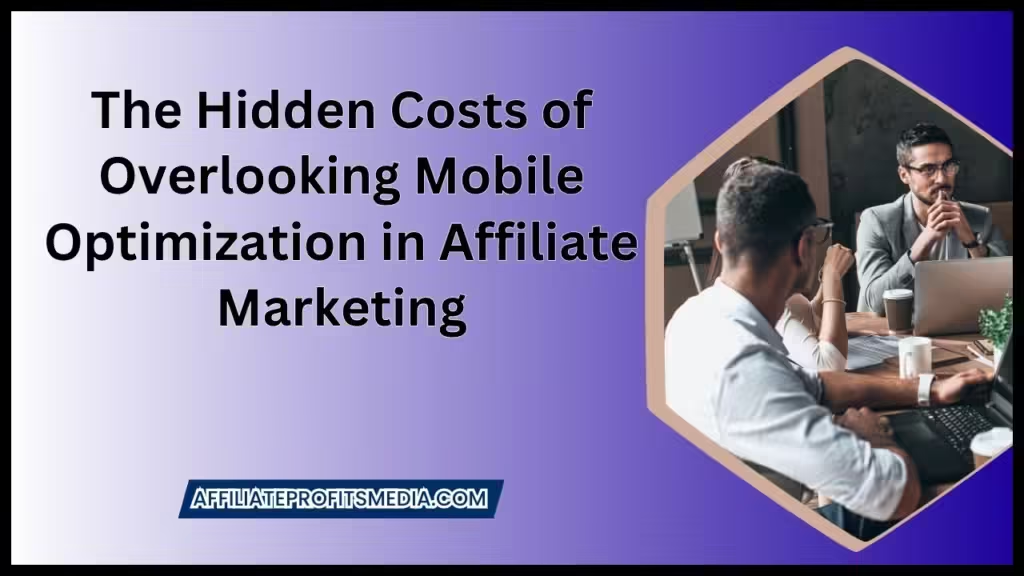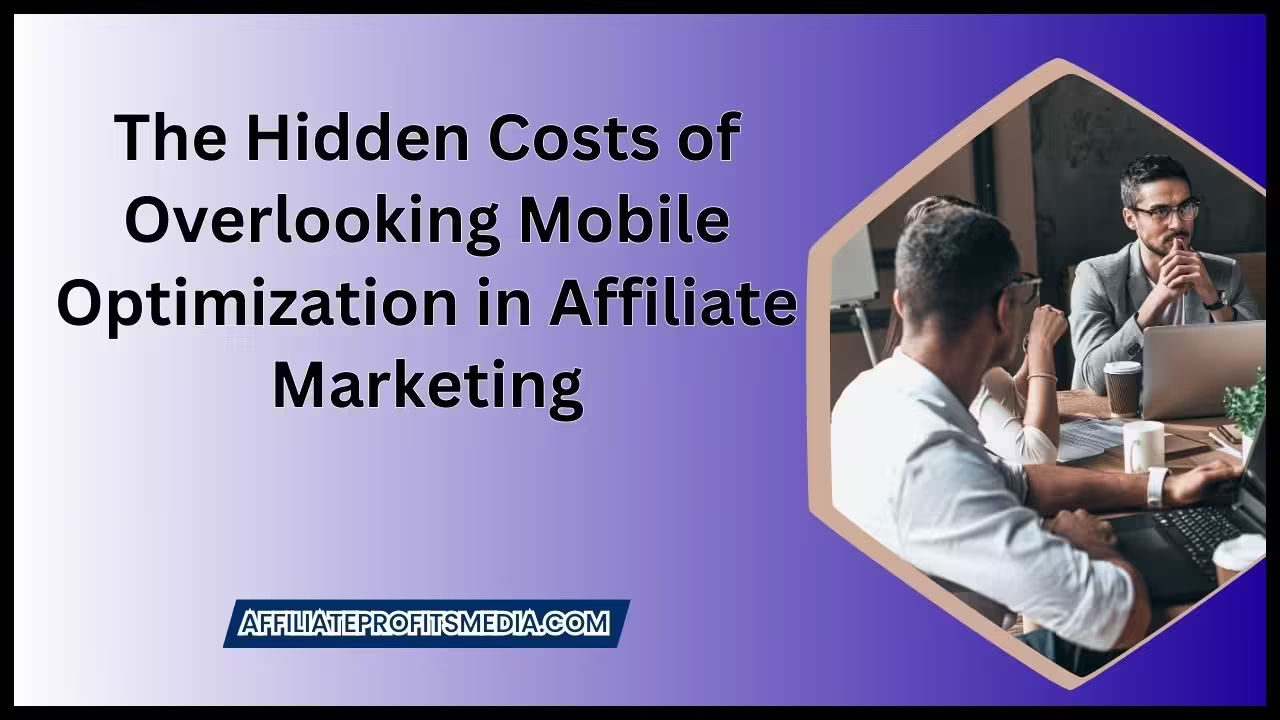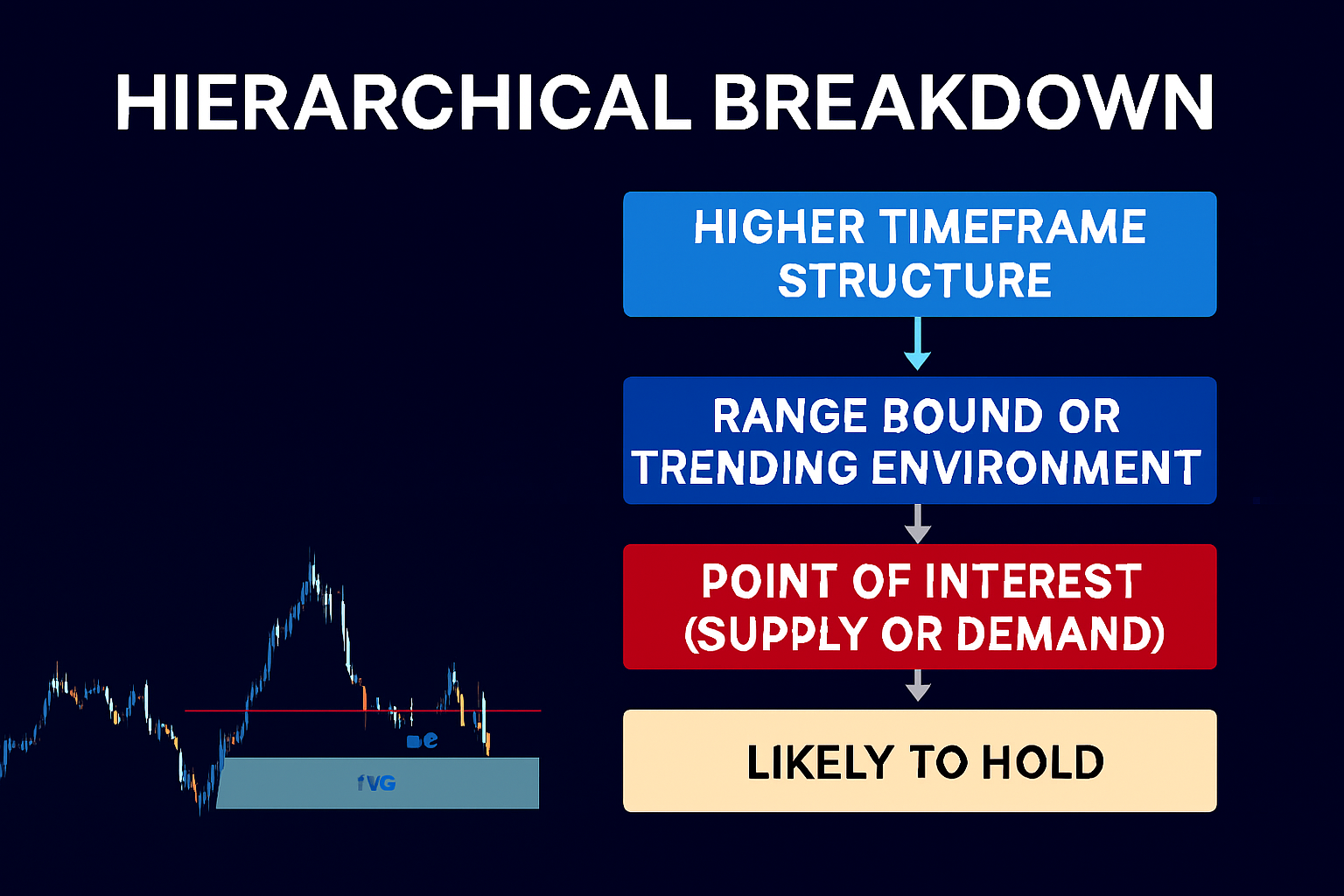Welcome to my article on The Hidden Costs of Overlooking Mobile Optimization in Affiliate Marketing. Now, mobile devices have become an integral part of our daily lives. With more people accessing the internet via their smartphones and tablets, mobile optimization has become crucial for businesses, especially in the realm of affiliate marketing. Overlooking mobile optimization can lead to significant hidden costs that can severely impact your affiliate marketing efforts. This article explores eight critical areas where the lack of mobile optimization can cost you dearly.
>> Here’s the Proven Way to Make $100-$200 Daily with 0 Investment – Watch This FREE Video and Start Now >>

1. Reduced Traffic and Engagement
When your website is not optimized for mobile devices, you risk losing a substantial amount of traffic. Mobile users are likely to abandon a site that doesn’t load properly or is difficult to navigate. Reduced traffic directly translates to fewer clicks on your affiliate links and lower engagement rates, ultimately leading to a decline in conversions and revenue. Ensuring that your site is mobile-friendly can help maintain and even increase your traffic levels.
2. Lower Search Engine Rankings (Mobile Optimization)
Search engines, particularly Google, prioritize mobile-friendly websites in their search results. If your site is not optimized for mobile, it can result in lower search engine rankings. This decrease in visibility means that potential visitors and customers are less likely to find your site through organic search. Investing in mobile optimization can enhance your SEO efforts, helping you achieve higher rankings and attract more organic traffic.
3. Decreased Conversion Rates
Mobile users typically have different behavior patterns compared to desktop users. They are often looking for quick, easy-to-access information and smooth, fast-loading pages. If your site isn’t optimized for mobile, users may struggle to find what they need or experience slow load times, leading to frustration and abandonment. This can significantly reduce your conversion rates. A seamless mobile experience can enhance user satisfaction and drive more conversions.
4. Higher Bounce Rates (Mobile Optimization)
A high bounce rate is a clear indicator that visitors are not finding your site engaging or easy to use. Mobile users who encounter a non-optimized site are likely to leave almost immediately, increasing your bounce rate. High bounce rates can negatively affect your search engine rankings and overall site performance. Optimizing for mobile can help keep visitors on your site longer, reducing bounce rates and improving overall engagement.
5. Lost Affiliate Commissions
Affiliate marketing relies heavily on clicks and conversions. If your site is not mobile-friendly, you are likely losing potential commissions from mobile users. Every lost click or conversion represents lost revenue, which can add up significantly over time. By optimizing your site for mobile, you can ensure that you capture every possible opportunity to earn affiliate commissions.
6. Negative User Experience (Mobile Optimization)
User experience (UX) is a critical factor in affiliate marketing success. A poor mobile experience can leave users frustrated and less likely to return to your site. Negative UX can also lead to negative reviews and word-of-mouth, which can further damage your reputation and reduce traffic. Providing a positive mobile experience can enhance your brand reputation, encourage repeat visits, and foster loyalty among your audience.
7. Increased Competition
In the competitive world of affiliate marketing, staying ahead of your competitors is essential. Many of your competitors are likely investing in mobile optimization. If you overlook this aspect, you risk falling behind. Potential customers may choose a competitor’s site that offers a better mobile experience. By optimizing your site for mobile, you can remain competitive and ensure that you are not losing customers to more mobile-friendly alternatives.
8. Higher Advertising Costs (Mobile Optimization)
If you use paid advertising to drive traffic to your site, a lack of mobile optimization can lead to higher costs. Many advertising platforms, including Google Ads, consider the mobile-friendliness of landing pages when determining ad quality scores. Poor mobile optimization can result in lower quality scores, leading to higher costs per click (CPC) and reduced ad effectiveness. By optimizing your site for mobile, you can improve your quality scores, reduce advertising costs, and achieve better returns on your investment.
>> Here’s the Proven Way to Make $100-$200 Daily with 0 Investment – Watch This FREE Video and Start Now >>
Reduced Traffic and Engagement
In the digital age, mobile optimization is crucial for any website. A lack of mobile optimization can significantly reduce traffic and engagement, which are vital for the success of affiliate marketing. Here are six key points illustrating how neglecting mobile optimization impacts traffic and engagement.
- Poor User Experience: Mobile users expect fast-loading, easy-to-navigate sites. A non-optimized site frustrates users, leading to high abandonment rates.
- Lower Search Rankings: Google prioritizes mobile-friendly sites in search results. Without mobile optimization, your site may rank lower, reducing organic traffic.
- High Bounce Rates: Users quickly leave non-optimized sites, increasing bounce rates and negatively affecting your site’s performance.
- Fewer Conversions: Difficult navigation and slow load times on mobile can lead to fewer clicks on affiliate links and lower conversion rates.
- Lost Revenue: Reduced traffic and engagement mean fewer opportunities to earn affiliate commissions, impacting overall revenue.
- Negative Perception: A poor mobile experience can harm your brand’s reputation, discouraging repeat visits and reducing user loyalty.
Investing in mobile optimization is essential to maintain traffic, enhance engagement, and boost affiliate marketing success.
Lower Search Engine Rankings (Mobile Optimization)
Mobile optimization is essential in today’s digital landscape. Failing to optimize for mobile can lead to lower search engine rankings, which significantly impacts website visibility and traffic. Here are seven key points highlighting how neglecting mobile optimization affects search engine rankings.
- Mobile-First Indexing: Google prioritizes mobile versions of websites for indexing, meaning non-optimized sites rank lower.
- Page Load Speed: Slow mobile page speeds negatively impact rankings, as search engines favor faster-loading sites.
- User Experience: Poor mobile UX leads to higher bounce rates, signaling search engines that your site is less relevant.
- Mobile Usability: Issues like small text and difficult navigation lower usability scores, affecting rankings.
- Responsiveness: Search engines prefer responsive designs that adapt to various screen sizes, ensuring better rankings.
- Local SEO Impact: Mobile optimization is crucial for local searches, affecting your visibility in local search results.
- Competitive Disadvantage: Competitors with optimized mobile sites will outrank you, reducing your share of search traffic.
Investing in mobile optimization is vital for maintaining strong search engine rankings, ensuring higher visibility and increased traffic.
Decreased Conversion Rates
Mobile optimization is crucial for maximizing conversion rates. Neglecting it can significantly decrease conversions, directly impacting revenue. Here are five key points illustrating this impact.
- Slow Load Times: Mobile users expect fast-loading pages. Delays lead to abandonment, reducing conversions.
- Poor Navigation: Complex or unclear navigation frustrates users, making it harder for them to complete desired actions.
- Unresponsive Design: Non-responsive designs fail to adapt to different screen sizes, leading to a poor user experience.
- Difficult Forms: Complicated or tiny forms deter users from filling them out, lowering conversion rates.
- Unclear CTAs: Mobile users need clear, easy-to-click calls-to-action. Poorly designed CTAs reduce engagement and conversions.
Optimizing for mobile is essential to improve user experience and maximize conversion rates, ultimately boosting your revenue.
Higher Bounce Rates (Mobile Optimization)
A mobile-optimized website is crucial for keeping users engaged. Ignoring mobile optimization can lead to higher bounce rates, where visitors quickly leave your site, impacting overall performance. Here are six key points on how poor mobile optimization affects bounce rates.
- Slow Load Times: Mobile users expect quick load times. Slow pages cause frustration and prompt users to leave immediately.
- Poor Navigation: Complex menus and difficult navigation on mobile devices make it hard for users to find what they need, leading to quick exits.
- Unreadable Content: Small text and images that don’t scale properly deter users from staying on your site.
- Unresponsive Design: Non-responsive designs that don’t adapt to different screen sizes provide a poor user experience.
- Pop-Ups and Ads: Intrusive pop-ups and ads are more disruptive on mobile, causing users to abandon the site.
- Difficult Interactions: Buttons and links that are too small or close together frustrate users, increasing bounce rates.
Optimizing for mobile reduces bounce rates by enhancing user experience, encouraging visitors to stay longer and engage with your content.
>> Here’s the Proven Way to Make $100-$200 Daily with 0 Investment – Watch This FREE Video and Start Now >>
Lost Affiliate Commissions
Mobile optimization is vital for affiliate marketing success. Neglecting it can lead to lost affiliate commissions, directly impacting your revenue. Here are seven key points illustrating how poor mobile optimization affects affiliate commissions.
- Reduced Traffic: Mobile users avoid non-optimized sites, leading to decreased traffic and fewer potential conversions.
- High Bounce Rates: Frustrating mobile experiences cause users to leave quickly, resulting in lost clicks on affiliate links.
- Poor User Experience: Difficult navigation and slow load times deter users from engaging with your content and links.
- Unresponsive Design: Non-responsive sites fail to display correctly on mobile devices, reducing user interaction with affiliate links.
- Difficult Transactions: Complicated checkout processes on mobile discourage purchases, lowering commission opportunities.
- Lower Search Rankings: Search engines favor mobile-friendly sites. Poor optimization leads to lower rankings and less organic traffic.
- Negative Reviews: Frustrated users may leave negative feedback, harming your reputation and reducing future traffic and commissions.
Optimizing your site for mobile is essential to capture affiliate commissions, improve user experience, and boost revenue.
Negative User Experience (Mobile Optimization)
In the world of affiliate marketing, a seamless user experience is crucial for retaining visitors and driving conversions. Poor mobile optimization can result in a negative user experience, impacting your site’s success. Here are six key points on how inadequate mobile optimization leads to a negative user experience.
- Slow Loading Times: Mobile users expect quick access to content. Slow loading pages frustrate users and increase the likelihood of them leaving.
- Difficult Navigation: Complex menus and unresponsive design make it hard for users to find what they need, leading to dissatisfaction.
- Unreadable Text: Small fonts and improperly scaled images make content hard to read on mobile devices.
- Inaccessible Buttons: Small or misaligned buttons hinder interactions, making it challenging for users to engage with your content.
- Intrusive Ads: Overwhelming pop-ups and ads disrupt the user experience, driving visitors away.
- Broken Links: Non-functioning links or buttons on mobile devices create frustration and reduce trust in your site.
Mobile optimization is essential for providing a positive user experience, which is crucial for retaining visitors and achieving affiliate marketing success.
Increased Competition
In the competitive world of affiliate marketing, staying ahead of the competition is essential. Failing to optimize your site for mobile can put you at a disadvantage. Here are seven key points illustrating how poor mobile optimization increases competition and affects your success.
- Lower Search Rankings: Mobile-unfriendly sites are penalized by search engines, causing lower rankings compared to competitors with optimized sites.
- Reduced User Retention: Competitors with better mobile experiences attract and retain users more effectively.
- Higher Bounce Rates: Users quickly leave non-optimized sites, favoring competitors with smoother mobile experiences.
- Lost Traffic Opportunities: Mobile users prefer optimized sites. Neglecting this aspect means missing out on potential traffic.
- Lower Conversion Rates: Competitors with optimized mobile sites achieve higher conversion rates, capturing more sales and commissions.
- Negative Reviews: Poor mobile experiences lead to negative reviews, damaging your reputation compared to competitors with better experiences.
- Increased Ad Costs: Non-optimized sites face higher ad costs due to lower quality scores on advertising platforms.
Optimizing your site for mobile is crucial to staying competitive in affiliate marketing, ensuring you don’t lose ground to rivals with better mobile experiences.
Higher Advertising Costs (Mobile Optimization)
In affiliate marketing, efficient advertising is crucial for maximizing returns. Poor mobile optimization can lead to increased advertising costs, impacting your overall budget. Here are six key points on how inadequate mobile optimization affects your advertising expenses.
- Lower Quality Scores: Advertising platforms like Google Ads factor in mobile optimization when assessing ad quality. Non-optimized sites receive lower scores, leading to higher costs per click (CPC).
- Reduced Ad Effectiveness: Ads directing users to a non-optimized site result in lower engagement and conversion rates, reducing the return on your ad spend.
- Higher Bounce Rates: Mobile users encountering a poorly optimized site are likely to bounce, wasting your advertising budget.
- Increased Competition: Competitors with mobile-optimized sites often have lower CPC and better ad performance, putting you at a disadvantage.
- Ad Spend Waste: Higher bounce rates and lower conversions mean more of your ad budget is wasted on ineffective clicks.
- Poor Conversion Tracking: Inefficient mobile experiences can skew conversion tracking, making it harder to optimize ad campaigns effectively.
Optimizing for mobile is essential to control advertising costs, improve ad performance, and maximize your return on investment.
Conclusion
Overlooking mobile optimization in affiliate marketing can have severe hidden costs, from reduced traffic and engagement to higher advertising costs and lost revenue. Ensuring that your site is mobile-friendly is not just a best practice but a necessity in today’s mobile-centric world. By investing in mobile optimization, you can enhance user experience, improve search engine rankings, and ultimately drive more conversions and revenue. Don’t let the hidden costs of neglecting mobile optimization undermine your affiliate marketing success.
>> Here’s the Proven Way to Make $100-$200 Daily with 0 Investment – Watch This FREE Video and Start Now >>
Thank you for taking the time to read my article “The Hidden Costs of Overlooking Mobile Optimization in Affiliate Marketing”, hope it helps!













